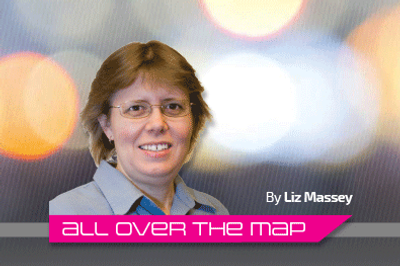By Liz Massey, September 2015 Issue.
On a Friday morning in late June, our community had one of its biggest victories ever. The U.S. Supreme Court recognized our Constitutional right to form legal same-sex relationships and to call them marriages. Our civil rights as people who identify as LGBT were specifically affirmed. As marriage advocate Evan Wolfson said after the decision was handed down, “The day of the gay exception is over.”
Achieving legal parity in our relationships is the culmination of 45 years of hard work by our activists and attorney advocates. But anyone who might think this win means we can shutter our political organizations and happily melt into the cultural mainstream should remember that marriage was a side issue, at best, for most of the post-Stonewall era.
When I came out in 1991, responding to the overwhelming impact of AIDS-phobia dominated the LGBT political landscape. We were busy trying to keep those infected with HIV alive and unstigmatized. And we were trying not to get fired or lose our housing if our advocacy work entered the public eye. A key survival strategy for many of us was moving almost entirely within queer circles, since trusting the larger society to treat us fairly was a far riskier proposition.
The irony is that while public acceptance and comfort of gay and trans individuals have increased substantially in the past generation, our legal protections have not. Just as in 1991, a queer person can be fired from their job in most jurisdictions simply for coming out, and gay students can be bullied, with few sanctions imposed upon their tormentors. People still become infected with HIV/AIDS and need access to treatment and services. LGBT teens rejected by their families swell the ranks of homeless youth, and trans individuals are still vulnerable to rejection and harassment as they reveal their authentic gender to the world. And our opponents, stung by our victory and dedicated to preserving their privilege, are testing out chilling new strategies that purport to be about “religious freedom,” but in the end boil down to enshrining their ability to treat poorly anyone with whom they disagree, and not having to suffer any legal consequences.
Our battlefronts will change as the legal status of our relationships change, but even if this has been your core activism issue, there are ways to channel that passion to assist the other parts of the movement that need our attention. Here are four ways to keep our movement’s momentum going forward during this time of transformation:
If you have been waiting “until it’s legal everywhere” to marry your beloved, start checking out LGBT-friendly wedding vendors. If you get invited to a same-sex wedding, clear your calendar so you can go. When it comes time for the newlyweds to sign their marriage certificate, say a prayer or word of thanks to all the people, all across the country, who helped make this moment possible.
2. Figure out where your heart is calling your activism.
Love working with kids? Help out with getting anti-bullying measures passed, eradicating LGBT teen homelessness or creating a safe space for queer kids in foster care. Want all employees to reach their full potential? Get behind workplace anti-discrimination efforts, or lend your support to an LGBT employee resource group at your company (or start a group if it doesn’t have one).
3. Discover activism roles that didn’t exist 10 or 20 years ago.
It used to be that you weren’t really “out” in some people’s eyes if you didn’t march in protests or speak at public forums. Today, you may wield just as much influence by living your queer life in front of others and normalizing it, or by blogging or posting in social media about what’s happening in our community.
4. Find creative ways to partner with allies outside the LGBT community.
Outside-of-the-community alliances both provide more people who are on our side, as well as highlighting other important issues (i.e., immigration, racial profiling, poverty) that impact vulnerable LGBT populations just as badly or worse than the general population.
In the end, our community, which emerged from the shadows of obscurity partly because we believed that we had the right to exist, will always have the task of championing the benefits of diversity, and liberating the misunderstood and oppressed. Queer liberation is a subset of human liberation, so we shall be busy with that assignment for a very long time if indeed we ever do achieve full legal parity in the United States.
Gay theorist Don Kilhefner suggests that after equality arrives, our community will still have gifts to give, based precisely on the struggles that we encountered on our way to liberation. He says, “We must learn to honor, not hide, our being different; affirm and celebrate our gayness in original and playful ways; acknowledge a rich hidden heritage both within and outside of us; and find new models to explain the body of information and intuitive knowledge we have been carrying for a long time but that had no way to get out.”
